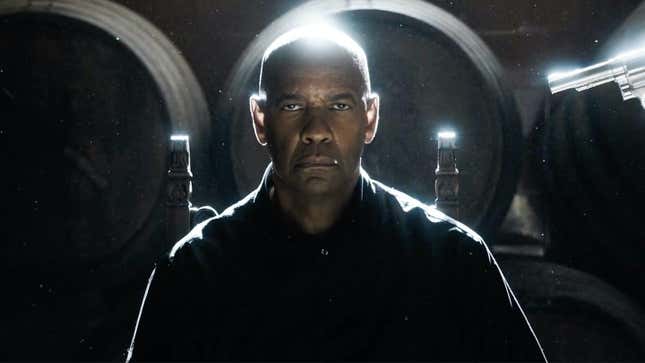
In The Equalizer 3, we find our hero, a somewhat longer-in-the-tooth Robert McCall (Denzel Washington), doing more or less (more really) of what he did in the original film, The Equalizer (2014), which, of course, is what he continued to do in The Equalizer 2 (2018) and, what Robert McCall, played by Edward Woodward, did in the titular series from 1985 to 1989. Or, for that matter, what the reimagined character, Robyn McCall (Queen Latifah), does as The Equalizer in the television series reboot from 2021. All of these McCalls find themselves called upon to protect (and occasionally avenge) the weak and the wronged, which they do with great aplomb while often dispensing bits of “spy-losophy” along the lines of this from The Equalizer 2, “There are two kinds of pain in this world,” says McCall as he tortures someone who has it coming, “the pain that hurts. And the pain that alters.” So far, though, there has only been one kind of Equalizer film; whatever the story’s specifics, they are all the same. Bad guys get hurt in ways that temporarily convince us that there’s justice in the world. The fact that it’s extrajudicial, bloody, and inevitable only makes it more satisfying.
For EQ3, the setting is Sicily, and the bad guys are relatively classic mafia types terrorizing the people of a local community for whom our Mr. McCall has taken a liking. How McCall (whom we first met nearly a decade ago working as a Home Mart clerk who recently retired from one of those alphabet agencies where they license people to kill) comes to be in Italy is part of an effective opening sequence that walks us through the remnants of his handy work, reminding us who he is and what he does, while setting up the film’s wholly unnecessary backstory. There are several familiar characters; the good cop and his lovely family, the discreet old doctor, the local fishmonger, and the sexy cafe owner, all threatened by the local swarthy gangster and his out-of-control little brother.
There is nothing new here narratively, save the setting (shot with picturesque beauty by Oscar-winning cinematographer Robert Richardson), the names of the characters, and the details of the offense for which the evil doers will have to pay. In the first film, the gangsters were Russian; in the second, they were mercenaries with whom McCall once worked; in this film it’s the Mafia. While hardly the most creative collection of future corpses, they’re easy to hate, they’re evil and they threatened someone or something McCall cares about and, therefore, must die in ways that are as horrible as they are cathartic for the audience.
A new context hasn’t been necessary in the nearly 40 years since the foundational narrative of The Equalizer was established. In The Equalizer 3, McCall will protect the weak, correct the wrongs, and terrorize the terrorists. It is a simple story tinged with perilous moments of jeopardy that our hero will survive because he’s The Equalizer. And the film would have been fine were it just that, but here we’re also treated to a re-teaming of Washington with his Man On Fire co-star Dakota Fanning.
She is an agency wonk whom director Antoine Fuqua—director of the previous two Equalizers—weaves into the story setup during the opening sequence, all of which plays as wholly tangential to the only thing any Equalizer project is ever really about—right overcoming wrong and vengeance on the wicked. The backstory, however pointless, does not diminish the tightly woven thriller that makes up the film’s central storyline. The one where McCall, even with his OCD behavior, is the only person you want to call when the situation is unfair and dire.
Michael Sloan and Richard Lindheim, creators of the original The Equalizer TV series (1985—1989), each had a hand in writing the 2014 and 2018 Equalizer films, along with screenwriter Richard Wenk (The Expendables 2, The Protege). Lindheim, who died in 2021 at age 81, is also credited with writing 46 episodes of The Equalizer television series starring Queen Latifah. We note this because neither Lindheim nor Sloan are credited with writing The Equalizer 3, which Wenk scripted solo.
Interestingly, the absence of the founders changes little about their creation, a character who can be found in narratives from the Epic of Gilgamesh to the Old and New Testaments of the Bible. It is the story of an avenging angel who, when all is lost, will save the day and bring vengeance to evildoers who had it coming. This was the underlying theme of the original series, the new series, and, as it turns out, all three Equalizer movies, including this one. What’s the old saying about if it’s not broken, make a sequel?
One can expect more equalizing in the future due to the strength of the context of these films. Rumor has it that John David Washington (Denzel’s movie-star son) may be cued up for the role in a prequel. Perhaps we’ll get to see where his sense of brutal righteousness comes from. And maybe we’ll even get another three satisfying movies out of it.
The Equalizer 3 opens in theaters September 1